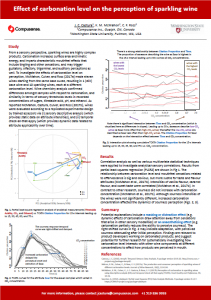Effect of carbonation level on the perception of sparkling wine
 From a sensory perspective, sparkling wines are highly complex products. Carbonation imparts characteristic mouthfeel effects that include tingling and other sensations, and may trigger gustatory, olfactory, trigeminal, and auditory perceptions as well. To investigate the effects of carbonation level on perception, McMahon et al (J Wine Res, in press, 2017) made eleven wines starting from the same base cuvee, resulting in 1 (still) base wine and 10 sparkling wines, each at a different carbonation level. Wine chemistry analysis confirmed differences amongst samples with respect to carbonation, and similarity in terms of sensory thresholds levels in recorded concentrations of sugars, titratable acid, pH, and ethanol. As reported McMahon et al (Food Qual Pref, 59, 14-26, 2017). Wines were evaluated according to a replicated experimental design by trained assessors via (i) sensory descriptive analysis (which provides static data on attribute intensities), and (ii) temporal check-all-that-apply (which provides dynamic data related to attribute applicability over time).
From a sensory perspective, sparkling wines are highly complex products. Carbonation imparts characteristic mouthfeel effects that include tingling and other sensations, and may trigger gustatory, olfactory, trigeminal, and auditory perceptions as well. To investigate the effects of carbonation level on perception, McMahon et al (J Wine Res, in press, 2017) made eleven wines starting from the same base cuvee, resulting in 1 (still) base wine and 10 sparkling wines, each at a different carbonation level. Wine chemistry analysis confirmed differences amongst samples with respect to carbonation, and similarity in terms of sensory thresholds levels in recorded concentrations of sugars, titratable acid, pH, and ethanol. As reported McMahon et al (Food Qual Pref, 59, 14-26, 2017). Wines were evaluated according to a replicated experimental design by trained assessors via (i) sensory descriptive analysis (which provides static data on attribute intensities), and (ii) temporal check-all-that-apply (which provides dynamic data related to attribute applicability over time).
Correlation analysis as well as various multivariate statistical techniques were applied to investigate analytical-sensory correlations, e.g. partial least squares regression (PLSR). The relationship between carbonation level and mouthfeel sensations related to effervescence is big and obvious, but more subtle for taste and flavour attributes. Intensities of vanilla flavour, caramel avour, and sweet taste were correlated. In contrast to other research, sourness did not increase with carbonation concentration. Although sourness intensities of the wines were not significantly different, increased carbonation concentration affected the dynamics of sourness perception. Specifically, increased carbonation delayed the onset (and extinction) of sourness perception. The sourness response temporal curve was right-shifted and damped. A potential explanation is that dynamic effects of carbonation draw attention away from sensations that arise in other sensory modalities, including gustation. Findings are relevant to product developers working on carbonated products, and suggest potential for further research for systematically investigating how carbonation level interacts with other wine components at different concentrations to affect how products are perceived in mouth.
![]()
Castura, J. C., McMahon, K., & Ross, C. F. (2017). Effect of carbonation level on the perception of sparkling wine. 15th Weurman Flavour Research Symposium. 18-22 September. Graz, Austria.